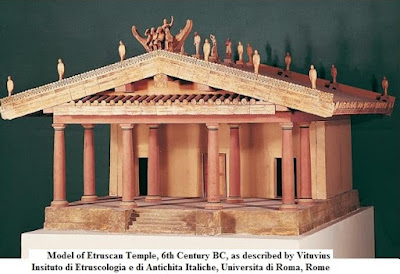The Sky, sacred to Uni, showing vividly over an Etruscan Palace (photo: Stock Art)
Cleric Spells (Uni)
Clerics of
Uni have access to the following spells. As haruspices (see Divinities and
Cults: Volume II), they gain a +3 bonus to cast all spells involving divination
and space, but a -3 penalty to all others.
1st Level: Create
Water, Cure Light Wounds, Detect Evil, Detect Magic, Light (as celestial radiance),
Purify Food & Drink, Protection From Evil, Purify Food and Drink (if
presented with good table manners), Remove Fear, Resist Cold, Sanctuary (if in
a civilized area), Divine WeatherD, Faerie FireD (as
starlight), Allure* (only works while at a party or other social gathering
though), Shield*
2nd Level:
Augury, Bless, Delay Poison, Know Alignment, Hold Person, Holy Chant, Reveal
Charm, Spiritual Weapon (wielded by spirits)
3rd Level: Continual
Light (seeming to come from the sky), Cure
Blindness, Cure Disease, Dispel Magic, Locate Object (if it is one of good
taste), Prayer, Remove Curse, Speak with Dead (only if its liver is available),
Call LightningD, Gust of Wind*
4th Level: Create
Food and Water (Tuscan cuisine), Cure Serious Wounds, Divination, Exorcise, Neutralize
Poison, Protection from Evil 10’ Radius, Temperature ControlD (to
pleasant temperatures only)
5th Level: Commune,
Cure Critical Wounds, Dispel Evil, Control WindsD, Atmosphere
Bubble*, Telekinesis*
6th Level: Find
the Path, Heal, Summon Aerial Servant (as a particular type of spirit), Control
Weather D
7th Level: Augury
(greater)- can give more details about a future event, Astral Projection, Restoration,
Wind Walk, Control Weather (greater)
D
Etruscan Palace Encounters
Though it’s
good to work to understand the Will of the Gods and to see the sky, one must
have time for refinement and scandalous behavior too!
Features (roll 1d10)
1. Small temple to a random Etruscan Divinity (see Divinities and Cults:
Volume II)
2. Statues (roll 1d6): [1] Man, [2] Woman, [3] Group, [4] Monster, [5]
Deity, [6] Other (50% chance of being of mounted on a roof)
3. Painted columns (75% chance of being red)
4. Murals (65% chance of being lewd)
5. Gymnasium (50% chance of nudity, even the women!)
6. Baths (100% chance)
7. Industry (roll 1d4): [1] Vineyard, [2] Smithy, [3] Urn making, [4] Other
8. Especially-defensible position (roll 1d4): [1] built on an especially
good hill, [2] thick-walled, [3] allied Palace nearby, [4] women inside are so
beautiful that it’s hard to attack
9. Necropolis (85% chance of being wealthy)
10. Theatre (50% chance of being ribald)
Inhabitants (roll 1d10)
1. Nobles (men & women: 50% chance of being nude; 50% chance of being
drunk; 100% chance of being clean-shaven and literate)
2. Servants (25% chance of being nude, drunk, clean-shaven, and/or
literate)
3. Slaves (50% chance of being barbaric)
4. Soldiers (see the upcoming Volume III for special abilities)
5. Workers (50% chance of being skilled)
6. Entertainers (75% chance of being skilled)
7. Spirits (25% chance of being hostile)
8. Haruspices (most similar to clerics of Uni, if not the same)
9. Foreigners (75% chance of being aghast at the libertine lifestyle of
the Etruscans)
10. Others (per Referee)
Events (roll 1d8)
1. Party
2. Feast
3. Hunt
4. Performance
5. Dance
6. Financial meeting
7. Orgy
8. Multiple (reroll twice)





